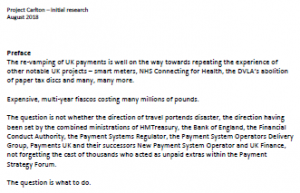Published on 31 August 2018
The sponsor of Project Carlton has signed off on the initial research and endorsed that it be shared for validation with five or six interested parties.
You can get a sneak preview of the Preface in the inset within this blog.
 The research plots the ministrations towards the UK payments landscape over the past 5 years of HMTreasury, the Bank of England, the Financial Conduct Authority, the Payment Systems Regulator, the Payment System Operators Delivery Group, Payments UK and their successors New Payment System Operator and UK Finance, and of a cast of hundreds – the unpaid extras acting within the Payment Strategy Forum.
The research plots the ministrations towards the UK payments landscape over the past 5 years of HMTreasury, the Bank of England, the Financial Conduct Authority, the Payment Systems Regulator, the Payment System Operators Delivery Group, Payments UK and their successors New Payment System Operator and UK Finance, and of a cast of hundreds – the unpaid extras acting within the Payment Strategy Forum.
This has added up to a huge weight of effort, within the context of a once in a generation opportunity.
The results have been on the very low side of reasonable expectations, out of all proportion to the investment so far, but worse is to come. In the name of innovation, choice and competition we have an agglomeration of market power into two actors – New Payment System Operator and Mastercard.
We also have a roadmap under New Payment System Operator to make all “retail” payment types interdependent within the New Payments Architecture (“NPA”) project, and to elevate the Faster Payments system in importance over the other payment systems, Faster Payments being the seedbed for the most rapidly increasing type of payment fraud – Authorised Push Payment Fraud enacted on the back of eBanking channels, be that mobile banking, remote banking or the new Open Banking.
The direction of travel is towards “push payments” (like BACS Credit, CHAPS and Faster Payments) and away from “pull payments” (like BACS Direct Debit, cheque and card), the latter having better consumer protection measures around them.
“Pull payments” are likely to be starved of investment going forward, and made to conform to the NPA model, hindering their ability to develop new feature and function, even were there investment funds available.
A core mechanism for bringing all of this about is the adoption of the ISO20022 XML data standard, despite its questionable track record in the Single Euro Payments Area as a platform for enabling innovation, and for spurring competition on any other measure than price.
Without revenues there can be no re-investment in resilience, or in new measures to combat emerging fraud threats.
This is the direction of travel, though, and it does not bode well for the UK economy or for the achievements of the benefits that these changes are supposed to bring about.
The projects have built up a head of steam and have strong support from the authorities. It is highly questionable whether the supertanker can be turned from within, which leaves two options – firstly to do nothing, which seems quite irresponsible. Secondly to build something either separately on a greenfield basis, or to try and wrest control of the UK’s “pull payment” systems away from NPSO and to develop them as a competitor to NPA.
